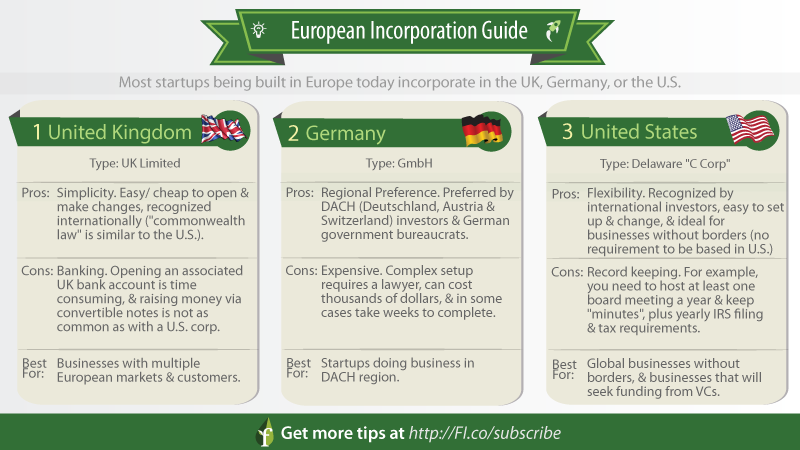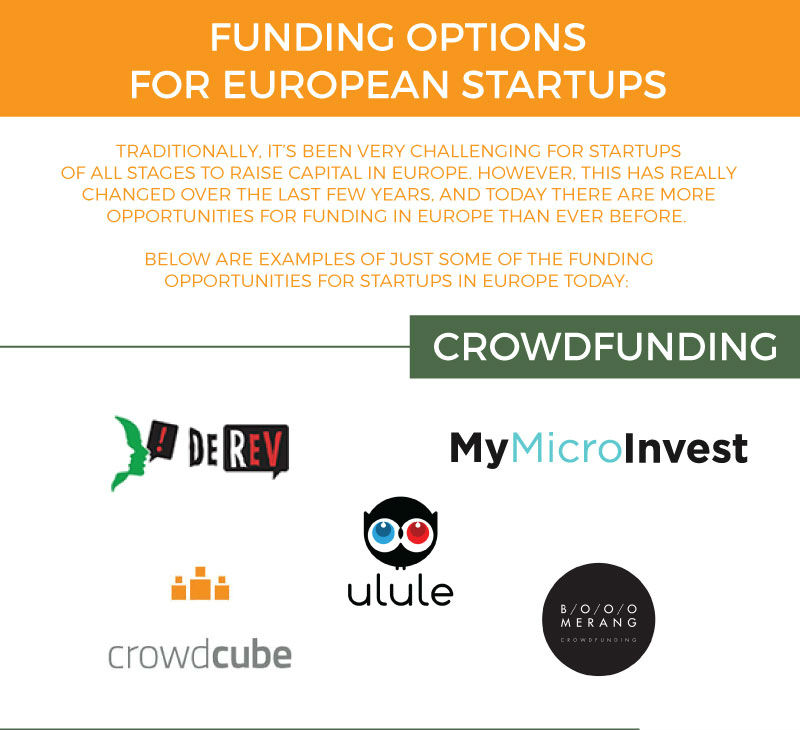
In recent years, countries throughout Europe have become hubs of innovation in the global startup scene. In fact, nearly every major European region has produced a wealth of promising tech companies in just about every vertical, from mobile to cloud services, healthcare to social impact, and many more.
However, the European startup ecosystem is still growing, and each country has its share of challenges and opportunities to traverse, which can make getting started confusing for aspiring entrepreneurs. Which is why we’ve created an exhaustive guide that provides beginning founders in Europe with the basics they need to launch their companies.
Legal Help for European Startups
Regardless of where you live and where your company is based, launching a startup requires founders to finalize numerous legal processes - like equity, intellectual property, and incorporation - to ensure smooth running enterprise. There are plenty of legal hurdles to go through before your company can become an officially recognized business entity, and to make matters worse, legal rules and regulations change from region to region. And while it can be difficult to traverse the intricacies of startup legal basics, there are fortunately several resources for founders looking to launch companies in Europe.
If you could benefit from expert legal advice and support, here some resources to consider for your startup.
iLINC is the European Network of Law Incubators, an organization designed to provide free legal support to startups while simultaneously offering postgraduate law students the opportunity to engage in professional practice in the dynamic world of technology start-ups. Their website serves both European startups looking for legal support and “law incubators”, or law firms who are interested in offering legal support to European startups. By serving as a bridge between startups and postgraduate law students, iLINC expands the purview of legal education while providing aspiring entrepreneurs with the resources the need, helping to build the next generation of lawyers and startups.
Founded in 2013, JAG Shaw Baker is a strategic law firm that advises entrepreneurs, companies, and investors in various emerging technology markets like life sciences, cleantech, and digital technology. The firm was founded by James Shaw and Tina Baker who have decades worth of experience working with top companies like SoundCloud, Moo, Transferwise, Zoopla, Wonga, FarFetch, and Mind Candy. With UK and US trained lawyers and an exhaustive understanding of the nuances, influencers, and contributors in the European technology, investor, and VC ecosystem, JAG Shaw Baker has become one of Europe’s top startup law firms in just a few years.
The IT IP Law Group Europe is a network of legal professionals and independent law firms in the areas of intellectual property rights and IT law. Consisting of lawyers throughout Europe, this organization helps ensure that your company’s legal needs are quickly met with minimal transaction cost, and that your case is handled by the representatives that are best suited to your company. One of the biggest assets of the IT IP Law Group Europe is its expansiveness, consisting of legal representatives in most countries in Europe, including Austria, Belgium, Switzerland, Germany, Denmark, Spain, France, the UK, Italy, Serbia, and more.
Incorporating Startups in Europe
Below is a simple outline of some of the main benefits and drawbacks amongst of incorporating in the U.K., Germany, and the U.S.

How to Raise Funding in Europe
While the United States may be the world’s primary entrepreneurial hub, Europe is quickly making a name for itself as a growing center in the international startup scene. And while it may be easy for aspiring European founders to assume that the only way to raise significant startup funding is to travel to the United States, there are actually more and more financial resources cropping up in Europe everyday for burgeoning startups. The rise in investor activity has increased sharply in recent years, meaning that it is now easier than ever to for entrepreneurs to raise funding for their companies.
In the Startupxplore article, “Financing Options for Startups Looking for Funding in Europe”, Jaime Novoa outlines some of the most popular means of fundraising for European startups.
Crowdfunding. While it might seem like almost every startup uses crowdfunding to raise money, there’s no denying that it’s still an incredibly effective way for early stage startups to acquire funding while promoting their products at the same time. Kickstarter and Indiegogo are two of the most popular crowdfunding platforms, but there are other regional sites that may be more useful, depending on where you live in Europe. For example,
- Crowdcube (UK)
- Ulule (France)
- Capital Cell (Spain & UK)
- MyMicroinvest (Belgium)
- Symbid (Netherlands)
- Goteo (Spain)
- Companisto (Germany)
- Booomerang (Denmark)
- Derev (Italy)
- Seedrs (UK)
Incubators and Accelerators. There is no doubt that the number of European startups has increased dramatically in recent years, which also means that the number of startup incubators and accelerators has grown as well. Below are some of the top institutions that you should consider joining.
- Founder Institute (multiple European locations)
- Scout24 (Germany)
- Startup Sauna (Finland)
- Techstars
- Telenet Kickstart (Belgium)
- Eleven (Bulgaria)
- StarCube (The Czech Republic)
- Accelerace (Denmark)
- GameFounders (Estonia)
- Startupbootcamp (multiple locations)
- Rockstart (multiple locations)
- INiTS (Austria)
- Zip (Croatia)
- H-Farm (Italy)
- Garage (Moldova)
- Fongit (Switzerland)
Equity Crowdfunding. If you are willing to give a portion of your company to investors in exchange for funding, equity crowdfunding is another option. Here is a list of several Europe-based equity crowdfunding platforms:
Syndicate Funding. This business model allows angel investors to syndicate deals with one another. This means that specific angel investors can lead investments in early stage startups and encourage other angel investors, as well as individual investors, to contribute funds to the investment. European entrepreneurs interested in syndicate funding are encouraged to check out Startupxplore, a startup funding community that aims to connect all startup professionals in Europe with its open, fast, and transparent startup financing system. Below are some other options for raising money from syndicates in Europe:
P2P Lending Platforms. There has been a dramatic expansion in the use of P2P lending platforms throughout Europe, which provide loans to small and medium-sized companies at lower interest rates than most banks. Below are some of Europe’s most popular P2P lending platforms.
- Funding Circle (UK)
- Auxmoney (Germany)
- CreditGate24 (Switzerland)
- Younited Credit (formerly Prêt d’Union, France)
- Bondora (Estonia)
- Geldvoorelkaar (Netherlands)
- Fixura (Finland)
Venture Capital Firms. Because of the sharp rise in entrepreneurial activity, more VC firms have launched to match the demand for startup funding in a variety of growing markets, including life sciences, energy, mobile, and more. Here are some of the top VC firms in Europe:
- TVM Capital Life Science (Munich)
- Forbion (Netherlands and Germany)
- Scottish Equity Partners (Scotland and London)
- Partech Ventures (Paris and Berlin)
- Endeavour Vision (Switzerland)
- Northzone (London, Oslo, Stockholm, and Copenhagen)
- Seedcamp (London)
- Anthemis Group SA (London and Luxembourg)
Local and Continental Institutions. While not the most obvious or popular means of startup fundraising, budding founders who are willing to accept public money should look into various local and continental institutions that co-invest with reputable VC firms. For example, there is the European Investment Fund, which is dedicated to fostering Europe’s SMEs by increasing their financial access through various financial intermediaries.
Startup Competitions. Startup competitions are a great way to not only raise funding for your startup, but to also increase your startup’s brand awareness and receive some useful feedback from experts and potential customers. Luckily, Europe has no shortage of events that cater specifically to emerging tech companies. Here are just a few of the top competitions worth checking out:
- Websummit (Lisbon)
- Slush (Helsinki)
- TechCrunch (multiple locations)
- Next Step Challenge (Denmark)
- DLD (Munich)
- CPDP (Belgium)
- CEE Digital Summit (Bulgaria)
- PODIM Conference (Slovenia)
- Sonar+D (Spain)
- Os!o Innovation Week (Norway)
Click the image below for a full infographic on European funding options.
Government Support for European Startups
Because of the rise in popularity of startups, European governments are slowly making more efforts to support local entrepreneurs as a means of spurring the economy and creating jobs. While each government initiative takes its own unique approach to fostering entrepreneurship, many of them have prioritized such core elements like ecosystem visibility, encouraging investments, ease of setting up a business, immigration, and business growth and acceleration.
Below are some of the top startup initiatives and efforts that are backed by government support:
Tech City UK was launched in 2010 by the UK Prime Minister David Cameron and supports startups in Greater London, Manchester, and other major cities around the UK. With public funding from the UK Government’s Department for Culture, Media & Sport, Tech City UK supports local entrepreneurs with targeted programs to help fill market gaps during the company’s lifecycle, provides an agile and responsive feedback loop with the government, and connects the digital sector in London, the UK, and internationally via international trade missions, media engagement and events.
La French Tech is a publicly funded initiative to promote French founders under a single brand in France, as well as those abroad, through a variety of activities. For example, they offer the French Tech Ticket, a program designed for non-french entrepreneurs from around the world who want to launch startup in or relocate to Paris. Another one of their programs is the Talent Passport, a quick and easy administrative process to obtain working visas in France if they are investors, researchers, tech employees, or other related roles.
Enterprise Ireland is a government organisation whose mission is to accelerate the development and growth of Irish companies in world markets. Working in partnership with Irish startups, Enterprise Ireland supports sustainable economic growth, regional development, and create jobs by helping local founders start, grow, innovate, and win export sales in global markets. They also provide funding and resources for college-based researchers to assist in the development of emerging technologies into industry, and helps connect prospective investors with promising companies.
Startup Lisboa is a startup incubator that was founded in 2011 by the Lisbon Municipality, Bank Montepio, and IAPMEI (Portuguese Agency for Competitiveness and Innovation IP). Designed to help founders launch their companies and offer support during the first years of creation, Startup Lisboa also provides companies office space, connections to strategic partners, and access to investments. Companies that are selected to participate are given expert mentorship and are taught how to attract customers and investors, scale up, and expand globally.
Tekes is a publicly funded organisation created to finance research, development, and innovation in Finland. This program works with Finland’s top innovative companies and research institutions, financing about 1,500 business research and development projects, and almost 600 public research projects at universities each year. As part of the Team Finland network, Tekes provides funding and support towards internationalising companies and attracting foreign investments to Finland. And as a bonus for participating companies, Tekes doesn’t derive any financial profit from its activities, nor does it claim any intellectual proprietary rights.
Final Thoughts
While this guide is in no way the final word on the European startup ecosystem as every country and every city has its own unique terrain that presents unique obstacles and resources for aspiring entrepreneurs, making it impossible to include them all in one post. But hopefully, there should be enough information here for European founders to get started. As you set out to launch your dream company, get out there and explore your local startup community, as it is always changing and growing, which means founders today have to be more resourceful and versatile than ever.




